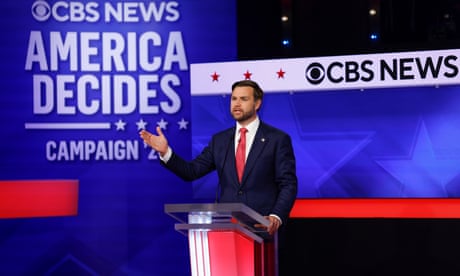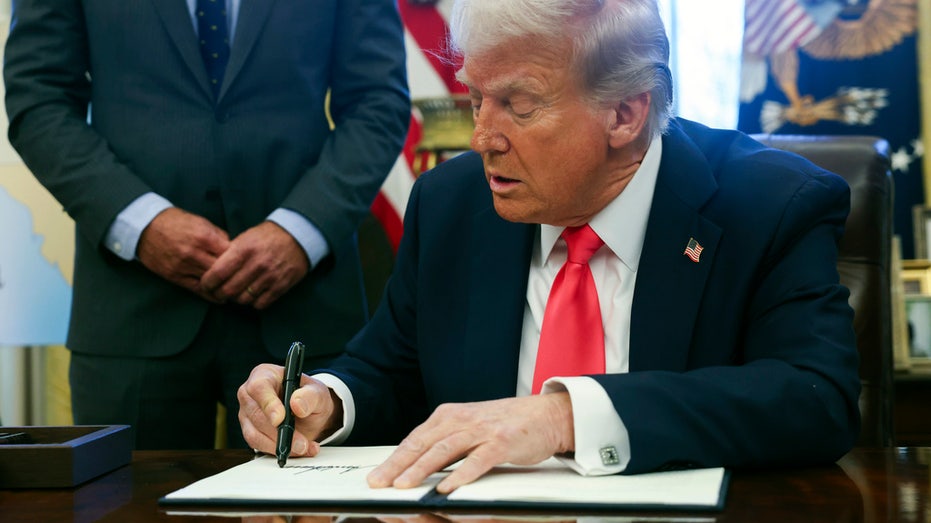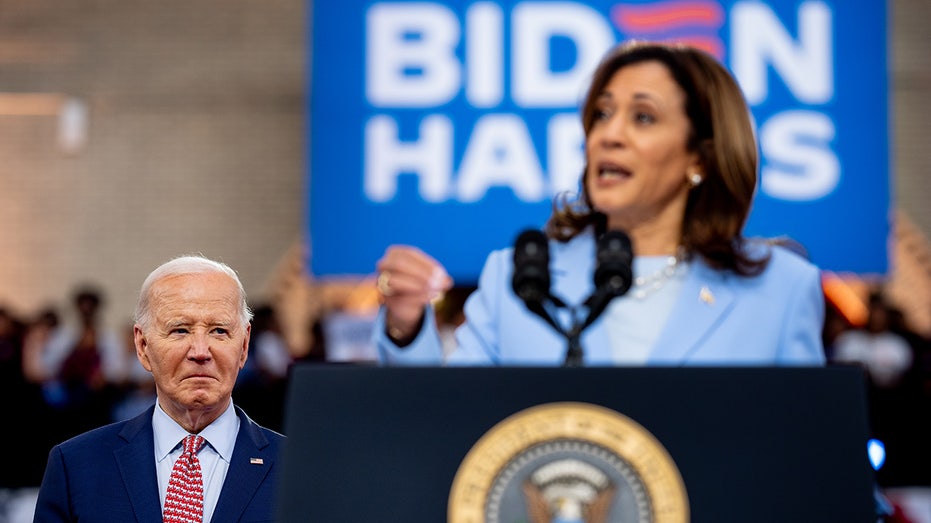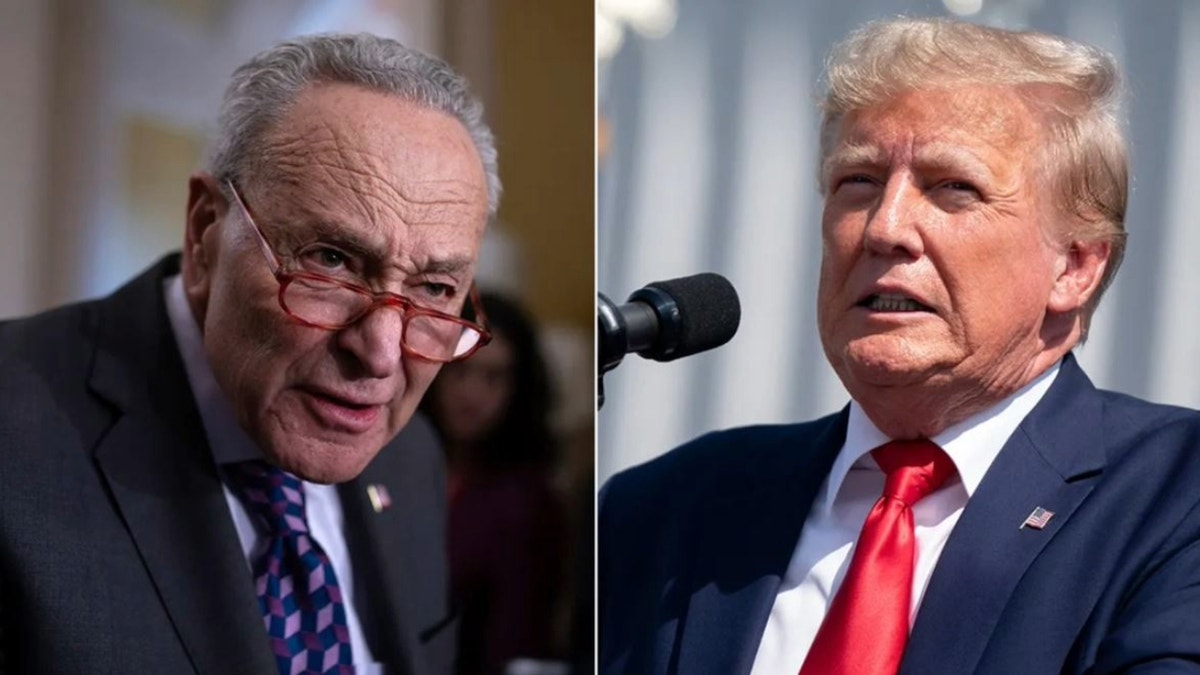- by foxnews
- 14 Mar 2025
JD Vance’s debate lines were so polished you could forget they made no sense | Moira Donegan
JD Vance’s debate lines were so polished you could forget they made no sense | Moira Donegan
- by theguardian
- 03 Oct 2024
- in politics

Maybe he thought the pink tie could help. JD Vance, the Ohio senator and Donald Trump's running mate, clearly set out to make himself seem less creepy at Tuesday night's vice-presidential debate, and a major target of this project was aimed at convincing women voters to like him. Vance, after all, has what pollsters call "high unfavorables", which is a polite way of saying that people hate his guts.
Much of this stems from Vance's extreme and inflexible views on abortion, his hostility to childless women, and his creepy statements about families and childrearing. He had to convince women that he's not out to hurt them or monitor their menstrual cycles; he had to try and seem kindly, empathetic, gentle. The resulting 90 minutes felt like watching a remarkably lifelike robot try to imitate normal human emotion. He smiled. He cooed. He spoke of an anonymous woman he knew whom he said was watching, and told her: "Love ya". And occasionally, when he was fact-checked or received pushback on his falsehoods or distortions, the eyes of his stiff, fixed face flashed with an incandescent rage.
A generous characterization of Vance's performance might be to call it "slick". Vance delivered practiced answers to questions on healthcare, abortion rights and childcare that were dense with lies and euphemism. Asked about his call for a national abortion ban, Vance insisted that what he wanted was a national "standard" - a standard, that is, to ban it at 15 weeks.
He spoke in what was probably supposed to be empathetic terms about a woman he had grown up with who had told him that she felt she had had to have the abortion she got when they were younger, because it allowed her to leave her abusive relationship - without clarifying that the laws that Vance supports would have compelled that woman he purports to care about to carry her abuser's child to term, and likely become trapped with him.
He claimed that Americans didn't "trust" Republicans on the abortion issue, but did not mention that they don't trust Republicans because those are the ones taking their rights away.
When asked about childcare, Vance spoke in eerily imprecise terms about encouraging people to choose their preferred "family model", without specifying exactly which "model" he had in mind. He spoke of the "multiple people who could be providing family care options" but did not specify if these "people" had anything in common with each other. In media appearances throughout his career, Vance has been more explicit: he means that women will perform childcare for free - dropping out of paid work in the public sphere to do so, if necessary.
Vance was confident and smiling as he delivered these lines; he had the greasy self-assurance of someone who is used to lying to people he thinks are stupider than him. He sounded every bit like the Yale Law lawyer that he is. Even when he was not degrading women's dignity or condescending to the two female moderators, his answers were often delivered with a polish that seemed intended to conceal the fact that they made no sense.
Asked about the housing crisis, for instance, he said that mass deportations - a horrific ethnic-cleansing operation proposed by the Trump campaign that would ruin communities, families and lives - would lower prices by decreasing demand. It was a kind of repeat of Jonathan Swift's A Modest Proposal, but this time it wasn't satire. He also suggested that the government could build housing on federal lands - but neglected to mention that most of those lands are in the vast, rural, empty Mountain West, in regions with lots of tumbleweeds and absolutely no jobs.
Perhaps Vance's quintessential moment of the night came early, when he was attempting to further his smears of the Haitian immigrant community of Springfield, Ohio, whom he had previously targeted with lies that they eat pets. Vance was cut off by the moderators, but talked over them insistently. "Margaret. Margaret. Margaret. Margaret", he said repeatedly, trying to strong-arm one of the women into letting him talk. As they corrected his misstatements, he whined to the women: "The rules were that you guys weren't going to fact-check!"
Tim Walz, the Minnesota governor, reportedly told Kamala Harris when he was being vetted for the job that he does not consider himself a good debater. Going in, expectations for him were low. And indeed Walz had an uneven night, sometimes appearing flustered or nervous. An early answer on foreign policy, in particular, was confused and unconvincing. But Walz visibly gained confidence throughout the debate, issuing more forceful answers, attacking Trump and Vance's record, and emphasizing himself, often successfully, as a homespun purveyor of goodwill and common sense.
He was most convincing on what seems to be, for him, the most morally animating issues: healthcare and abortion. Walz named Amber Thurman, a woman killed by an abortion ban, as someone whose life could have been saved were it not for Trump's policies; he spoke with passion and clarity of how Trump's plan to reverse the Affordable Care Act would kick millions off their insurance.
But perhaps Walz's best moment came near the end of the debate, in a conversation about democracy, when he pointedly asked JD Vance to say whether Trump lost the 2020 election. Vance dodged.
"That's a damning non-answer," Walz said. It could have summarized Vance's whole performance.
- by foxnews
- descember 09, 2016
Southwest flyers fire back over airline ending free checked bag policy: 'Nail in the coffin'
Southwest has customers sounding off after the airline announced an end to its checked bag policy, leading some flyers to say they'll "boycott" the airline.
read more





